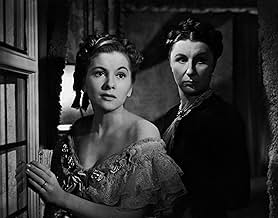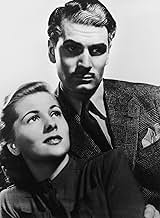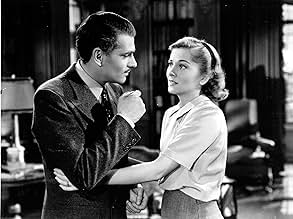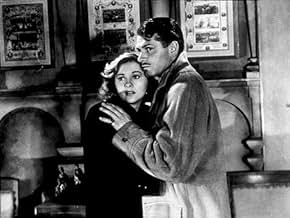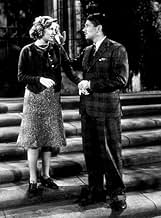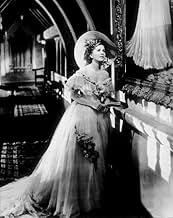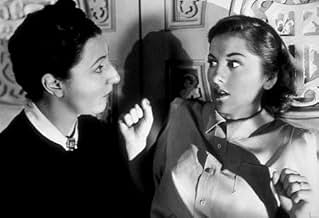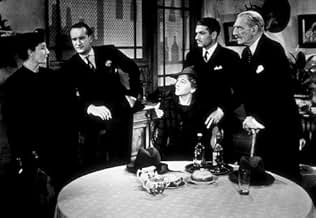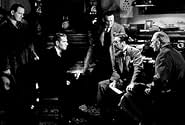Rebecca
- 1940
- Tous publics
- 2h 10min
Un jeune Lord anglais emmène sa jeune épouse dans son manoir où plane le souvenir de sa première femme, Rebecca...Un jeune Lord anglais emmène sa jeune épouse dans son manoir où plane le souvenir de sa première femme, Rebecca...Un jeune Lord anglais emmène sa jeune épouse dans son manoir où plane le souvenir de sa première femme, Rebecca...
- Réalisation
- Scénario
- Casting principal
- Récompensé par 2 Oscars
- 10 victoires et 10 nominations au total
Bunny Beatty
- Maid
- (non crédité)
Billy Bevan
- Policeman
- (non crédité)
Résumé
Reviewers say 'Rebecca' is acclaimed for its atmospheric storytelling and psychological tension, showcasing Alfred Hitchcock's masterful direction. The film's haunting ambiance, complex characters, and enigmatic Rebecca are highlighted. Key themes include identity, memory, and the struggle of the second Mrs. de Winter. Performances by Joan Fontaine, Laurence Olivier, and Judith Anderson are praised. Cinematography and set design enhance the gothic suspense. Some find the plot uneven and the ending less satisfying, but it remains a significant work in Hitchcock's career.
Avis à la une
This is one of my favorite movies of all time. Definitely my favorite classic. There are some that come close, such as Citizen Kane, Spellbound, and Psycho, but none quite compare to this amazing movie.
The first thing that you notice is the outstanding cinematography. You have to remember that this movie was made in 1940, when they didn't have the technology we have now. But that first shot of the water beating up against the rocks grabs you and for one split second you wonder if maybe this isn't part of the movie but rather something filmed just recently. But then you see the familiar face of Laurence Olivier, reminding you that this was made 60 years ago, a fact that forever amazes me. The only oscar it won besides Best Picture was well deserved.
Another thing that makes it such a wonderful film is the acting. I have debated on whether Laurence Olivier's character, the tortured Maxim de Winter, is the pitiable character or if his second wife played by Joan Fontaine is really the one to feel sorry for. Every time I watch it I see it from a different point of view. Joan Fontaine is excellent. Laurence Olivier is wonderful, but that's no surprise. The only thing that bugs me is that it seems in every movie he's in (well, at least, everything I've seen him in), he always plays the same type of character. But he's extremely good at it, so I suppose it doesn't matter.
But although Joan Fontaine and Laurence Olivier are wonderful, Judith Anderson steals the show! The first time I watched the movie, I was immediately grabbed by her stunning performance as the sinister Mrs. Danvers. You hardly notice the other characters when she's in the scene. She acted the part so well that it's strange to imagine that she was any different in real life.
With a wonderful storyline, and a very surprising ending, Rebecca well deserves the title as the only of Hitchcock's films to win the oscar for Best Picture. Although it may not be the most famous of all his films, it is without a doubt the greatest
The first thing that you notice is the outstanding cinematography. You have to remember that this movie was made in 1940, when they didn't have the technology we have now. But that first shot of the water beating up against the rocks grabs you and for one split second you wonder if maybe this isn't part of the movie but rather something filmed just recently. But then you see the familiar face of Laurence Olivier, reminding you that this was made 60 years ago, a fact that forever amazes me. The only oscar it won besides Best Picture was well deserved.
Another thing that makes it such a wonderful film is the acting. I have debated on whether Laurence Olivier's character, the tortured Maxim de Winter, is the pitiable character or if his second wife played by Joan Fontaine is really the one to feel sorry for. Every time I watch it I see it from a different point of view. Joan Fontaine is excellent. Laurence Olivier is wonderful, but that's no surprise. The only thing that bugs me is that it seems in every movie he's in (well, at least, everything I've seen him in), he always plays the same type of character. But he's extremely good at it, so I suppose it doesn't matter.
But although Joan Fontaine and Laurence Olivier are wonderful, Judith Anderson steals the show! The first time I watched the movie, I was immediately grabbed by her stunning performance as the sinister Mrs. Danvers. You hardly notice the other characters when she's in the scene. She acted the part so well that it's strange to imagine that she was any different in real life.
With a wonderful storyline, and a very surprising ending, Rebecca well deserves the title as the only of Hitchcock's films to win the oscar for Best Picture. Although it may not be the most famous of all his films, it is without a doubt the greatest
Hitchcock's first American movie, a word, American that is, that should be put in quotes because as Hitchcock pointed out, all of the cast and almost all of the crew were British. The film has already garnered so many comments that I'll avoid repeating most of them. The plot I'm sure has been thoroughly outlined and professionally analyzed but a few points are worth emphasis.
The plot of very precisely structured. It consists basically of a man who is the dream of many women in the 1940s audience: ruggedly handsome, intelligent, keen witted, a bit commanding but not too much, fabulously wealthy, a touch roguish, and mysterious. It's the mystery that provides the plot engine. Every incident of his past emotional life needs to be pried out of Maxim deWinter (what a name, suggesting frigidity and distance) as if it were an abcessed tooth. Each secret, as he reveals it, is a surprise to his wife. Except for the final secret uncovered in the plot, which surprises everybody. Maxim could clear the whole mystery up with an hour's worth of private conversation with his wife. But of course he doesn't, or else there would be no story. That's why Hamlet takes so long to slaughter Claudius. And why the Indians don't shoot the horses as they're chasing the stagecoach.
The acting. Olivier is extremely good at impersonating deWinter with all his charm and challenge. George Sanders is the best cad that the movies ever produced, and he proves it again here. Mrs. Danvers has a face and an expression that looks like an ice sculpture. The implicit lesbianism in her character of course had to remain implicit, but it is still rather a shock when she tenderly unfolds Mrs. DeWinter's nightie and says smoothly, "Look, you can see my hand through it." As for Joan Fontaine, a friend in Ireland said of her performance, "She does the shivering wife very well." Precisely put. With her delicate bone structure, fragile looking limbs, and her overall ikabani flower arrangement appearance, her wide asymmetrical eyes, with one brow arching up over her pale forehead, she looks about to faint with fright through half the movie. The only thing coarse about her is her wardrobe: bulky knit sweaters over her girlish bosom, long flapping drab skirts over her small but saucy rump, and those clodhoppers she wears while clunking about the house. She does the shivering naif in at least two other films of the period -- Hitchcock's "Suspicion" and "Jane Eyre." In fact, rummaging through the disarranged attic that is my long-term memory, I can't really remember her "doing" any other role.
It's the closest Hitchcock ever came to making what was then called "a woman's picture." It received a "best picture" Oscar, which went to Selznick. Something Hitchcock seemed to resent for the remainder of his life. It was a commercial and critical success and it deserved to be.
The plot of very precisely structured. It consists basically of a man who is the dream of many women in the 1940s audience: ruggedly handsome, intelligent, keen witted, a bit commanding but not too much, fabulously wealthy, a touch roguish, and mysterious. It's the mystery that provides the plot engine. Every incident of his past emotional life needs to be pried out of Maxim deWinter (what a name, suggesting frigidity and distance) as if it were an abcessed tooth. Each secret, as he reveals it, is a surprise to his wife. Except for the final secret uncovered in the plot, which surprises everybody. Maxim could clear the whole mystery up with an hour's worth of private conversation with his wife. But of course he doesn't, or else there would be no story. That's why Hamlet takes so long to slaughter Claudius. And why the Indians don't shoot the horses as they're chasing the stagecoach.
The acting. Olivier is extremely good at impersonating deWinter with all his charm and challenge. George Sanders is the best cad that the movies ever produced, and he proves it again here. Mrs. Danvers has a face and an expression that looks like an ice sculpture. The implicit lesbianism in her character of course had to remain implicit, but it is still rather a shock when she tenderly unfolds Mrs. DeWinter's nightie and says smoothly, "Look, you can see my hand through it." As for Joan Fontaine, a friend in Ireland said of her performance, "She does the shivering wife very well." Precisely put. With her delicate bone structure, fragile looking limbs, and her overall ikabani flower arrangement appearance, her wide asymmetrical eyes, with one brow arching up over her pale forehead, she looks about to faint with fright through half the movie. The only thing coarse about her is her wardrobe: bulky knit sweaters over her girlish bosom, long flapping drab skirts over her small but saucy rump, and those clodhoppers she wears while clunking about the house. She does the shivering naif in at least two other films of the period -- Hitchcock's "Suspicion" and "Jane Eyre." In fact, rummaging through the disarranged attic that is my long-term memory, I can't really remember her "doing" any other role.
It's the closest Hitchcock ever came to making what was then called "a woman's picture." It received a "best picture" Oscar, which went to Selznick. Something Hitchcock seemed to resent for the remainder of his life. It was a commercial and critical success and it deserved to be.
Hitchcock felt 'Rebecca', his first Hollywood film, was a compromise, but as a viewer I just can't fault it. It's a masterpiece in my opinion, full of suspense, mystery and brooding atmosphere. It's also one of the most romantic movies I've ever seen. I've watched it several times over the years, and even now that I know all the plot twists and turns (quite shocking on your first viewing), it never fails to hook me in. One of the reasons it really works is the flawless casting. I'm not much of an Olivier fan but he's superb as de Winter, with just the right mixture of charm and coldness. And Joan Fontaine is just perfect as de Winter's new bride. I can't spot an unconvincing moment in her performance and can't imagine any other actress in the role. Hitchcock subsequently used her in 'Suspicion' with Cary Grant. She was also excellent in that but 'Rebecca' is a much stronger movie. The supporting cast also includes some brilliant performances, especially Judith Anderson ('Laura') as the extremely creepy Mrs. Danvers, George Sanders who plays Rebecca's slimy cousin, and Nigel Bruce in a typical role as de Winter's bumbling brother-in-law Major Lacy. Sanders subsequently worked again with Hitchcock in 'Foreign Correspondent', and Bruce played Cary Grant's lovable pal "Beaky" in 'Suspicion'. I sometimes think that Hitchcock's 1940s movies are overlooked by many because they are regarded as being too "old fashioned", but for me movies like 'Suspicion', 'Saboteur', 'Lifeboat' and 'Spellbound' are some of the most entertaining movies Hitchcock ever made, and 'Rebecca' is the best of the lot. If you want to be totally enthralled for two hours just watch 'Rebecca'!
This is a Daphne Du Maurier's story (from a best-seller novel) concerning a prominent widower (Laurence Olivier) called Maxim De Winter who finds a gorgeous and timid young girl (Joan Fontaine) who is serving to an old Mistress (Florence Bates) . They are married and head to Manderley , the familiar mansion (in the exterior actually is a scale model). But Maxim is haunted by the ghost first wife , an enigmatic Rebecca , who died in mysterious circumstances . There works as a servant the creepy and obsessive housekeeper , Mrs Danvers (Judith Anderson,a famous stage actress in her most important role) and sh meets a cynic gentleman (George Sanders).
This film has suspense , romance , unlimited tension , full of lingering images and with the typical touches Hitchcock . Besides , a literately and thoughtful dialog signed by Joan Harrison (Hitchcock's usual screenwriter) though lacking humor . After ¨39 steps¨and ¨Jamaica Inn¨ , Hitch was encouraged to go to America and promptly shot his first work in Hollywood hired by the great producer David O'Selznick . Fine performance by Laurence Olivier , he married Vivien Leigh and he wished to her as protagonist but Hitch hired Joan Fontaine who took seven rehearsal sessions until the engaging . Joan Fontaine as a shy bride young is superb and enjoyable . Judith Anderson as a spooky and cold house keeper is top-notch, her role as obsessed person by the glamorous Rebecca is unforgotten and immortal . Atmospheric and perceptible music by Franz Waxman and sensational visual style by the cameraman George Barnes . The picture won Academy Awards for Best film and cinematography . The movie was brilliantly directed by the Master of Suspense . It's remade in inferior versions for Television, the 1980 adaptation with Jeremy Brett as Maxim and 1996 rendition with Charles Dance and Emilie Fox . The motion picture is indispensable watching for Hithcock lovers achieving the maximum impact on his audience.
This film has suspense , romance , unlimited tension , full of lingering images and with the typical touches Hitchcock . Besides , a literately and thoughtful dialog signed by Joan Harrison (Hitchcock's usual screenwriter) though lacking humor . After ¨39 steps¨and ¨Jamaica Inn¨ , Hitch was encouraged to go to America and promptly shot his first work in Hollywood hired by the great producer David O'Selznick . Fine performance by Laurence Olivier , he married Vivien Leigh and he wished to her as protagonist but Hitch hired Joan Fontaine who took seven rehearsal sessions until the engaging . Joan Fontaine as a shy bride young is superb and enjoyable . Judith Anderson as a spooky and cold house keeper is top-notch, her role as obsessed person by the glamorous Rebecca is unforgotten and immortal . Atmospheric and perceptible music by Franz Waxman and sensational visual style by the cameraman George Barnes . The picture won Academy Awards for Best film and cinematography . The movie was brilliantly directed by the Master of Suspense . It's remade in inferior versions for Television, the 1980 adaptation with Jeremy Brett as Maxim and 1996 rendition with Charles Dance and Emilie Fox . The motion picture is indispensable watching for Hithcock lovers achieving the maximum impact on his audience.
I spent the majority of this film thinking about how lucky M. Olivier really was. To be able to wrap his arms around Joan Fontaine and kiss her. Oh my. She's one of the most beautiful women I've ever seen (almost, but not quite as beautiful as Veronica Lake). She's also absolutely perfect in the role of the second Mrs. DeWinter, taking a character that could have become a cloying bore in less capable hands and transforming her into a sympathetic and interesting figure.
The movie, on the whole, is similarly amazing, capturing the spirit and the tone of those great Gothic romances. Watching Rebecca, I was reminded (pleasantly) of Wuthering Heights; I do not mean to suggest that in some way this film re-tells the tale of Cathy and Heathcliff, but rather that Rebecca has the feel of Bronte's novel (I am most certainly not talking about the William Wyler adaptation a few years before the release of Rebecca. That's a terrible film that somehow manages to mis-interpret the novel).
I must assume that the guiding hand of Hitchcock played no small role in recreating the feel of a Gothic romance. There are very few that would be able to take a love story, infuse it with such gloom, with such a sense of foreboding, and still manage to create something that ends happily without it feeling like a cop-out. I'd also like to draw everyone's attention to the incredibly moving section of the film that occurs between the arrival of the second Mrs. DeWinter at Mandalay and the masqued ball. The emotional strain on the Joan Fontaine character is so palpable, so absolutely taxing, that it actually pains me to watch. I hurt along with her. Few other movies affect me so emotionally - one of them is Vertigo.
All in all, this is a fantastic piece of film-making from Hollywood's golden age. Laurence Olivier is in top-form, as he plays the quiet, sad Maxim and George Sanders is positively hateful.
10/10 - a visceral masterpiece
The movie, on the whole, is similarly amazing, capturing the spirit and the tone of those great Gothic romances. Watching Rebecca, I was reminded (pleasantly) of Wuthering Heights; I do not mean to suggest that in some way this film re-tells the tale of Cathy and Heathcliff, but rather that Rebecca has the feel of Bronte's novel (I am most certainly not talking about the William Wyler adaptation a few years before the release of Rebecca. That's a terrible film that somehow manages to mis-interpret the novel).
I must assume that the guiding hand of Hitchcock played no small role in recreating the feel of a Gothic romance. There are very few that would be able to take a love story, infuse it with such gloom, with such a sense of foreboding, and still manage to create something that ends happily without it feeling like a cop-out. I'd also like to draw everyone's attention to the incredibly moving section of the film that occurs between the arrival of the second Mrs. DeWinter at Mandalay and the masqued ball. The emotional strain on the Joan Fontaine character is so palpable, so absolutely taxing, that it actually pains me to watch. I hurt along with her. Few other movies affect me so emotionally - one of them is Vertigo.
All in all, this is a fantastic piece of film-making from Hollywood's golden age. Laurence Olivier is in top-form, as he plays the quiet, sad Maxim and George Sanders is positively hateful.
10/10 - a visceral masterpiece
Oscars Best Picture Winners, Ranked
Oscars Best Picture Winners, Ranked
See the complete list of Oscars Best Picture winners, ranked by IMDb ratings.
Le saviez-vous
- AnecdotesOver 20 actresses were screen-tested for the role of Mrs. de Winter, which eventually went to newcomer Joan Fontaine. One of them was Vivien Leigh, for whom Sir Laurence Olivier was pressing, as they were a couple at the time.
- GaffesIn the outside take of Manderley seen in the scene where the Narrator stares at one window being closed, it's a miniature, as is the 'Mrs Danvers' dummy dressed in black. You can realize this by the motion of the window as it's being closed, not in a continuous way, but by little fast jumps, which look too unreal.
- Citations
[the new Mrs. de Winter wants to dispose of Rebecca's letters]
The Second Mrs. de Winter: I want you to get rid of all these things.
Mrs. Danvers: But these are Mrs. de Winter's things.
The Second Mrs. de Winter: *I* am Mrs. de Winter now!
- Crédits fousThe original 1940 credits read "Selznick International presents its picturization of Daphne Du Maurier's 'Rebecca'". The credits on the re-issue version read "The Selznick Studio presents its production of Daphne Du Maurier's 'Rebecca'".
- Versions alternativesThe opening credits were re-done (with different font) for the 1950's re-release of the movie. It is these credits that have turned up on all telecasts of the film (even as recently as 2013) and all previous video releases. The Criterion release (which is now only available through outlet stores) restores all of the credits to their original form.
- ConnexionsEdited into The Last Tycoon: Pilot (2016)
- Bandes originalesLove's Old Sweet Song (Just a Song at Twilight)
(1884) (uncredited)
Music by J.L. Molloy
Hummed by Joan Fontaine
Meilleurs choix
Connectez-vous pour évaluer et suivre la liste de favoris afin de recevoir des recommandations personnalisées
- How long is Rebecca?Alimenté par Alexa
- In what year or era is this Movie set? Was it considered a modern movie in it's day?
- What is 'Rebecca' about?
- Is this movie based on a book?
Détails
Box-office
- Budget
- 1 288 000 $US (estimé)
- Montant brut mondial
- 113 328 $US
- Durée2 heures 10 minutes
- Couleur
- Rapport de forme
- 1.37 : 1
Contribuer à cette page
Suggérer une modification ou ajouter du contenu manquant




